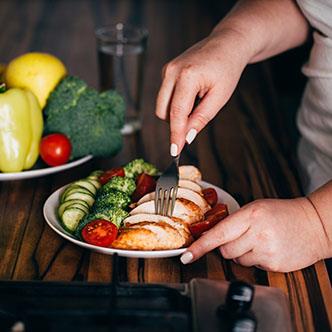
Women who ate slightly more than the recommended daily amount of protein were less likely to develop
atrial fibrillation, a heart rhythm disorder, compared with those who ate less protein, according to research being presented at American College of Cardiology’s Annual Scientific Session Together with World Congress of Cardiology. Atrial fibrillation, also called AFib, can lead to
stroke and
heart failure if not well managed.
Protein is a crucial part of women’s diets, especially as they age, because it can help prevent frailty, and loss of bone mass and lean muscle mass. But it seems that getting more protein also may help ward off AFib, too.
Researchers analyzed data from over 99,000 postmenopausal women (median age of 64) who are part of the Women’s Health Initiative Randomized Controlled Trials and Observational Study. They found that women who ate 58-74 grams of protein a day were 5%-8% less likely to develop AFib.
So how much more protein does this translate to? Not much, said Daniel Gerber, MD, cardiovascular medicine fellow at Stanford University, and the study’s lead author.
“It’s not a huge amount, we’re talking about eating 10-20 more grams of protein per day—that’s only 4 ounces of healthy protein such as chicken breast or salmon, a cup of Greek yogurt or two eggs,” he said. “Of course, when we talk about increasing protein intake, it needs to be with heart-healthy foods and lean proteins, not with cheeseburgers and other foods that are high in saturated fat, cholesterol and sugar.”
Of the women in the study, 21,258 (21.3%) developed new AFib during the average 10-year follow-up period. Researchers excluded women with existing heart rhythm issues. Women reported their protein intake using a food questionnaire, and researchers used validated urine tests to confirm how much protein was consumed. The women were then divided into four groups based on protein intake: < 58 grams per day, 58-66 grams per day, 66-74 grams per day, and > 74 grams per day. Researchers looked for new cases of AFib among them. The average protein intake was 60 grams per day. Women who ate between 58 and 74 grams a day had significantly less risk of developing AFib.
“Women with the lowest protein intake—which was roughly equivalent to the current recommended daily amount of protein in the U.S.— had the highest incidence of AFib, and eating a little more was protective, even after taking into account other factors that can predispose someone to develop AFib,” Gerber said. These factors included age, ethnicity, education, and other cardiovascular conditions and risk factors such as body mass index, physical activity, tobacco and alcohol use, high blood pressure, high cholesterol, diabetes, coronary and peripheral artery disease, and heart failure.
Current U.S. guidelines recommend consuming 0.8 grams of protein per kilogram of bodyweight, which for a 140-pound person is about 51 grams per day. In the United Kingdom, the recommendation is even lower at 0.75 grams of protein per kilogram daily. Older women can lose a half-pound of lean body mass per year. That is partly why they are told to increase their protein intake.
“Based on our findings, it seems that eating more protein may not only help strengthen women physically, but it may also have cardiovascular benefits in terms of reducing AFib and related death, strokes, and heart failure,” Gerber said. “About 1% of the U.S. population has AFib and, with an aging population, it is projected to increase several-fold by 2050. So doing something as little as eating an extra few grams of protein a day could potentially have a huge impact across the population.”
This study is limited in that it only looks back at medical records rather than being prospective in nature to randomize women to different groups of more or less protein and track their health over time. It also does not report what types of protein the women consumed or correspond to any specific popular diet. More research is needed to further understand the relationship between protein and a lower risk of AFib.